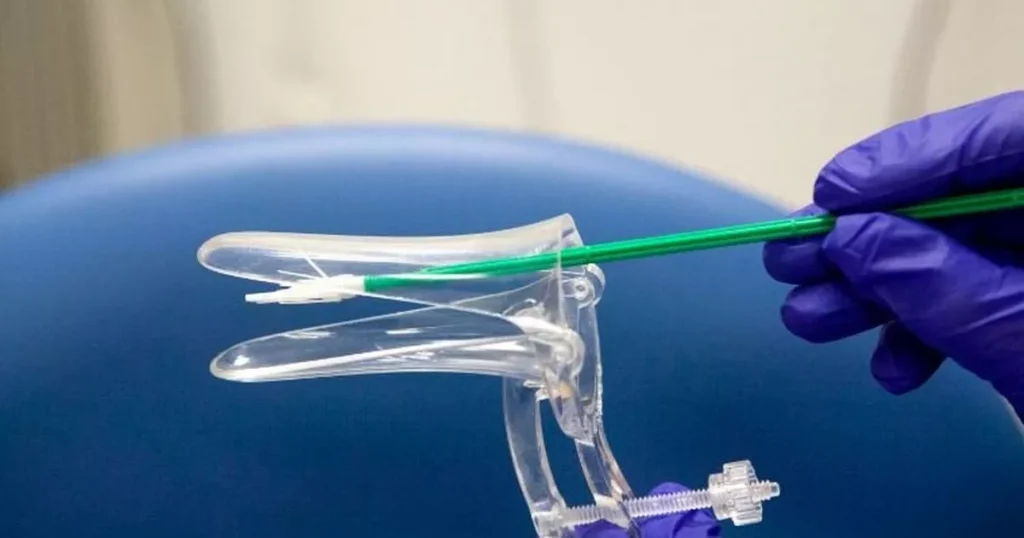The cervical cancer screening programme is crucial for your healthcare. During a smear test in London, a small plastic speculum is gently inserted into the vagina to allow a clear view of the cervix. A brush sample is then collected and sent to a specialised lab to test for human papillomavirus (HPV). Early detection of HPV enables timely treatment, often preventing the development of cancer.
What is Cervical Screening Exactly?
Cervical screening is a vital procedure that checks for the presence of human papillomavirus (HPV) infection. If the doctor detects a high-risk HPV infection, they will examine the cervix cells more closely. This test does not diagnose cancer; instead, it identifies any abnormal changes in the cervix, helping to prevent cancer from developing. A qualified nurse or doctor will perform the test, taking a small sample of cells for examination. This process is quick, simple, and usually takes just a few minutes.
The healthcare provider uses a soft brush to collect the sample and then sends it to the laboratory for HPV testing.
Who Should Get a Smear Test?
The NHS invites women aged 24 and over to have a smear test every 3-5 years until they turn 64. If you seek additional peace of mind or if a private gynaecologist in London has advised you, they can provide a smear test for sexually active women outside the standard 3-5-year interval.
If you have experienced any of the following symptoms, you should speak to a doctor to determine if a smear test is necessary:
- Pain in your lower back, pelvis, or abdomen
- Changes in your vaginal discharge
- Unusual vaginal bleeding
- Pain during sex
What is HPV?
HPV, or Human Papillomavirus, is a group of sexually transmitted viruses affecting over 70% of sexually active individuals at some point. Most people clear the virus naturally within a few months. With over 200 strains, some types of HPV cause harmless skin warts, while high-risk strains can lead to cellular changes. Persistent infections with high-risk HPV types are a significant cause of cervical cancer and cancers in the oropharynx and anogenital regions. Persistent HPV infection is linked to more than 99% of cervical cancer cases, according to studies.
Who Should Not Have a Smear Test?
You should avoid having a smear test if:
- You have used vaginal lubricants or creams within two days of your smear appointment.
- You have had a total or partial hysterectomy resulting in the removal of your cervix.
- If you are experiencing abnormal bleeding—please consult a doctor for advice.
- You are currently on your period; it is best to wait until it ends.
- You have previously had cervical cancer.
- You are less than 12 weeks post-natal.
- You have never had sex.
- You are pregnant.
If you are concerned about cervical cancer but cannot have a smear test in London due to the above reasons, consider booking an appointment with a private gynaecologist. They can offer expert advice, support, and reassurance.
Does it hurt?
Cervical screening experiences vary, but most women feel little to no pain. Consider techniques like breathing exercises, listening to your favourite music, or requesting a smaller speculum. If you experience pain, do not hesitate to ask the nurse or doctor to stop. It is also helpful to let the healthcare professional know if you are feeling nervous so they can help ease your discomfort.
Making Your Smear Test in London More Comfortable
- Request Suitable Equipment: If available, ask the nurse to use a plastic or smaller speculum. Plastic speculums are often warmer than metal ones and allow for better visibility. If you have Vaginismus, you might prefer a smaller speculum or inserting it yourself.
- Distract Yourself with Music or TV: Bring your headphones and phone to listen to music or watch something during the test. If you need to remember your headphones, ask the nurse if you can still watch or listen.
- Consider Vaginal Oestrogen if You Are Post-Menopausal: If you are going through menopause, using vaginal oestrogen for two weeks before your appointment might make the test more comfortable.
- Adjust Your Position for Comfort: If you have a retroverted uterus, placing your fists behind your lower back and adjusting your position on the couch can make the test more comfortable.
- Count to 100: Try slowly counting from 1 to 100 during the procedure. Many find this technique to relax, and the test is often over before you reach 50.
- Take Paracetamol: Consider taking a dose of paracetamol 30 minutes before your smear test. It can help ease any discomfort.
- Ask for More Lubricant: If you feel that too little lubricant is used during the exam, please ask for more.
If you are overdue for a smear test, book your appointment today with your gynaecologist. A trusted private gynaecology clinic in London offers routine cervical screening and colposcopy procedures to support your health.
What does it mean if my results come back as abnormal?
For most women, test results will return normal, indicating no need for further tests. However, it is crucial to continue attending regular cervical screening appointments, as changes can develop over time.
If your results are abnormal, it might indicate the presence of HPV or cell changes, but this does not mean you have cancer. Depending on the test results, your healthcare provider may recommend a repeat cervical screening in six months or a colposcopy, which involves a more detailed examination of your cervix and is typically performed in a hospital, lasting no longer than 30 minutes.
During a colposcopy, the healthcare provider can remove any abnormal cells detected during the procedure for further analysis.
Frequently Asked Questions (FAQs)
Q1) Do I Still Need a Smear Test if I am Virgin?
If you have never engaged in any form of sexual activity or contact, your risk of developing cervical cancer is low. However, low risk doesn’t mean no risk. HPV can also spread through oral sex, genital touching, or sharing sex toys. Speak with your clinician to explore the best options for your situation.
Q2) Do I Need a Smear Test If I’ve Had the HPV Vaccine?
Yes, you do. The HPV vaccine doesn’t protect against all types of HPV, so it’s crucial to attend your smear test when invited.
Q3) Can You Get Tested for All HPV Types?
The NHS programme screens for the most common high-risk HPV types (16, 18) as these are the most likely to cause cervical cancer. However, you can choose a private smear test in London that checks for both high-risk and low-risk HPV subtypes. Discuss this option with your clinician.







